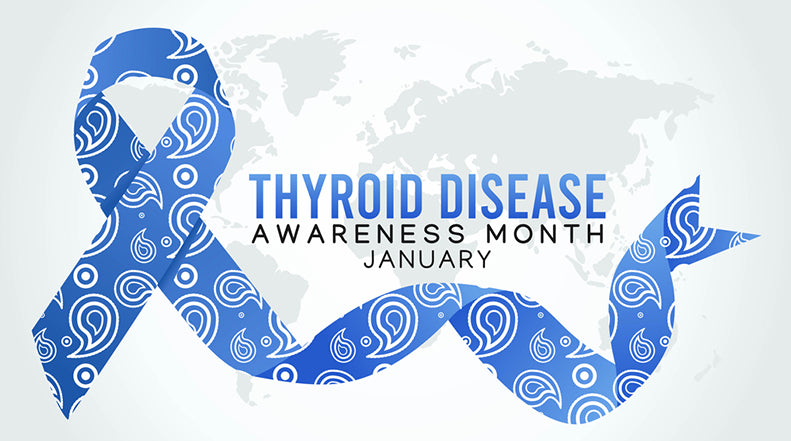National Thyroid Cancer Awareness Month

Every January is National Thyroid Awareness Month, a time when we acknowledge those who personally suffer with thyroid related issues or people you may know. According to the American Thyroid Association, 1 in 10 people suffer with a thyroid disorder. They also found that at least 1 in 8 women will develop a thyroid disorder in her lifetime!
THYROID AWARENESS
Thyroid awareness is key to helping people recognize the symptoms of thyroid problems, increase awareness of thyroid diseases, and provide education on prevention, treatment, and cure.
With better awareness, people will know when to talk to their doctors about testing and treatment. to increase awareness of thyroid diseases as well as prevention, treatment, and cure.
What is the Thyroid ?
The thyroid is a small butterfly shaped gland located just above your collarbone and in front of the windpipe. This gland controls important functions such as regulating breathing, heart rate, body weight, muscle strength, cholesterol, and body temperature.
Thyroid disease refers to a number of conditions that affect how the gland functions. The thyroid can be either overactive or underactive and both conditions can lead to health problems. Two of the most common thyroid diseases are hyperthyroidism and hypothyroidism.
HYPERTHYROIDISMAlso known as overactive thyroid disease, this condition occurs when your thyroid gland produces excess levels of the thyroid hormone thyroxine. Additionally, this thyroid disease can increase your body’s metabolism, causing weight loss and an irregular heartbeat.
HYPOTHYROIDISM
Having an under-active thyroid is also known as hypothyroidism. Essentially, this condition occurs when the thyroid gland doesn’t produce enough thyroid-stimulating hormone (TSH). Hypothyroidism’s deficiency of thyroid hormones can disrupt things such as heart rate, body temperature, and all aspects of metabolism. Major symptoms include fatigue, cold sensitivity, constipation, dry skin, and unexplained weight gain.
THYROID CANCER
Thyroid cancer begins when the cells grow and multiply rapidly. These cells form a tumor and the abnormal cells can spread throughout the body.
There are no early symptoms. However, as the cells grow, they may cause a lump in the neck, swollen lymph glands, voice changes, and difficulty swallowing. Most cases of thyroid cancer can be cured with surgery to remove most or all of the thyroid.
THE FOUR TYPES OF THYROID CANCER
-
Papillary thyroid cancer
The most common type of all thyroid cancers. It grows slowly but may spread to lymph nodes on the neck. -
Follicular thyroid cancer
The second most common type of thyroid cancer. These cancer nodules grow slowly and near areas with high iodine deficiencies in the body. Thankfully, this is one of the easiest forms of thyroid cancer to treat. -
Medullary thyroid cancer
This is less common, and cases are usually hereditary. However, it has a higher chance of spreading to the lymph nodes than other types. -
Anaplastic thyroid cancer
While this is the most aggressive form of thyroid cancer, it is thankfully the rarest. It is very dangerous because it grows rapidly and easily spreads.
If you are diagnosed with thyroid cancer, treatment options will depend on the type of cancer you have.
DIAGNOSING THYROID DISEASES
When diagnosing thyroid diseases, doctors use your medical history, a physical exam, and specialized blood tests. Some of these blood tests examine the amount of thyroid-stimulating hormone (TSH) in your blood. With these tests, a doctor can tell from your TSH levels if you have hyperthyroidism or hypothyroidism.
Thyroid disorders can be treated by medications or, in some cases, surgery. Treatment will depend on the particular disease of the thyroid.
During National Thyroid Awareness Month this January, lets show support by spreading knowledge regarding thyroid-related diseases and how we can all work together to fight this disease. For those who have already been diagnosed with thyroid disease and have gone through thyroid removal surgery (thyroidectomy) NewGel+ offers many products to help with your scar appearance. The most commonly strips for thyroidectomy scars are our 1” x 6” strips and our 2” x 8” strips. NewGel+E topical gel is another popular choice, especially on new scars.




Comments